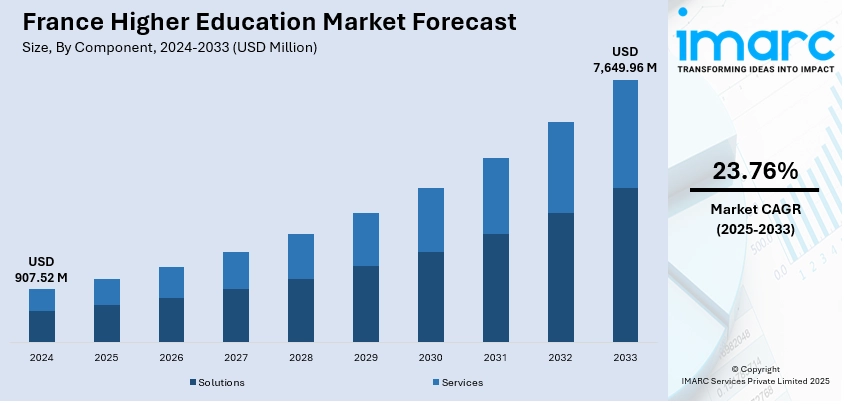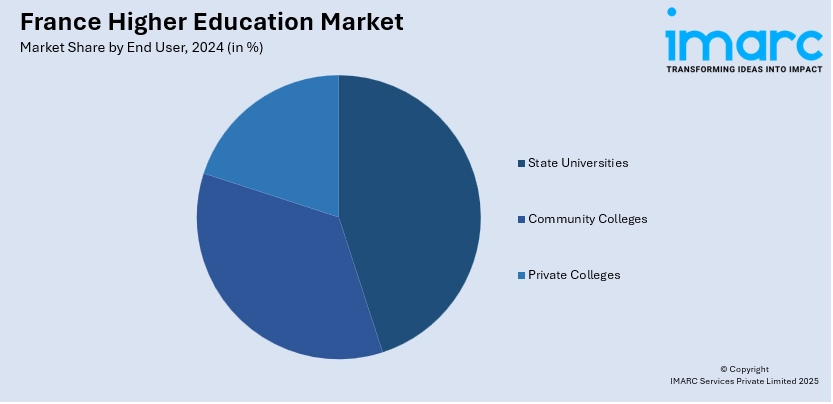
France Higher Education Market Size, Share, Trends and Forecast by Component, Deployment Mode, Course Type, Learning Type, End User, and Region, 2025-2033
France Higher Education Market Overview:
The France higher education market size reached USD 907.52 Million in 2024. The market is projected to reach USD 7,649.96 Million by 2033, exhibiting a growth rate (CAGR) of 23.76% during 2025-2033. The market is driven by rising demand for flexible learning models, accelerated by digital adoption post-pandemic and supported by government initiatives such as the "Digital Campus" project. Additionally, industry-aligned education reforms, such as apprenticeships and STEM-focused programs under "France 2030," enhance employability and attract corporate partnerships. The influx of international students, drawn by cost-effective online options and strong career pathways is further augmenting the France higher education market share.
|
Report Attribute
|
Key Statistics
|
|---|---|
|
Base Year
|
2024 |
|
Forecast Years
|
2025-2033
|
|
Historical Years
|
2019-2024
|
| Market Size in 2024 | USD 907.52 Million |
| Market Forecast in 2033 | USD 7,649.96 Million |
| Market Growth Rate 2025-2033 | 23.76% |
France Higher Education Market Trends:
Increasing Demand for Online and Hybrid Learning Programs
The market itself is going through a significant transition to online and blended models of learning. The COVID-19 pandemic placed pressure on the speed of change as schools were compelled to move swiftly towards digital learning models. Beyond having already dabbled in online models, students are also obviously seeking flexibility. They wish to be in a position to integrate their study with employment or with other individual obligations, and therefore, universities and business schools are piling degree offerings, micro-credentials (such as stackable credentials), hybrid/blended courses, etc. Government funding schemes such as France's Digital Campus project, co-funding with institutions, e-learning infrastructure and innovation further signal the direction of change. France's "Digital Campus" program, backed by the €54 Billion (approximately USD 62.31 Billion) France 2030 plan, aims to revolutionize e-learning infrastructure, enhance digital learning, and encourage technological innovation. With a projected digital economy market size of €70.5 billion (approximately USD 81.34 Billion) by 2024, France's focus on Cloud, AI, and cybersecurity creates significant opportunities for higher education institutions to introduce advanced technologies into their teaching programs. As the country seeks to become a digital transformation leader on a global scale, universities are leveraging government investment to expand their digital capabilities, preparing students for the needs of future industries. Additionally, international students, who contribute substantially to France’s education economy, are increasingly attracted to online programs due to lower costs and visa-free accessibility. However, challenges remain, including ensuring academic quality and student engagement in virtual environments. Institutions that successfully integrate technology with interactive and personalized learning experiences will gain a competitive edge in this changing market.

To get more information on this market, Request Sample
Growing Emphasis on Employability and Industry Partnerships
The rising focus on employability and stronger ties with industries is also supporting the France higher education market growth. Employers increasingly demand graduates with practical skills, prompting universities to redesign curricula with more internships, apprenticeships, and project-based learning. The French government’s "France 2030" investment plan emphasizes vocational training and STEM fields to align education with labor market needs. The French government's France 2030 investment strategy, with a budget of €54 Billion (approximately USD 62.29 Billion), allocates over €12 Billion (approximately USD 13.68 Billion) for research and higher education through the National Research Agency (ANR). Since its launch in 2021, the program has received over 80 calls for proposals, resulting in more than 3,000 project submissions, and is stimulating valuable innovation from French universities and research institutions. Through its focus on innovative sectors with a future outlook, France 2030 aims to enhance research strength and academic quality, thereby solidifying the country's position as an international leader in innovation. Leading business and engineering schools are forming corporate partnerships to offer dual-degree programs, certifications, and direct recruitment pathways. Additionally, the rise of lifelong learning has led to an expansion of executive education and short-term professional courses tailored to upskill workers. This trend reflects broader European movements toward competency-based education, where degrees are valued for their direct applicability to careers. Institutions that foster strong industry connections and integrate real-world problem-solving into their programs will attract more students and enhance graduate employability, reinforcing France’s position as a top study destination.
France Higher Education Market Segmentation:
IMARC Group provides an analysis of the key trends in each segment of the market, along with forecasts at the country and regional levels for 2025-2033. Our report has categorized the market based on component, deployment mode, course type, learning type, and end user.
Component Insights:
- Solutions
- Student Information Management System
- Content Collaboration
- Data Security and Compliance
- Campus Management
- Others
- Services
- Managed Services
- Professional Services
The report has provided a detailed breakup and analysis of the market based on the component. This includes solutions (student information management system, content collaboration, data security and compliance, campus management, and others), and services (managed services and professional services).
Deployment Mode Insights:
- On-premises
- Cloud-based
A detailed breakup and analysis of the market based on the deployment mode have also been provided in the report. This includes on-premises and cloud-based.
Course Type Insights:
- Arts
- Economics
- Engineering
- Law
- Science
- Others
The report has provided a detailed breakup and analysis of the market based on the course type. This includes arts, economics, engineering, law, science, and others.
Learning Type Insights:
- Online
- Offline
A detailed breakup and analysis of the market based on the learning type have also been provided in the report. This includes online and offline.
End User Insights:

- State Universities
- Community Colleges
- Private Colleges
The report has provided a detailed breakup and analysis of the market based on the end user. This includes state universities, community colleges, and private colleges.
Regional Insights:
- Paris Region
- Auvergne-Rhône-Alpes
- Nouvelle-Aquitaine
- Hauts-de-France
- Occitanie
- Provence Alpes Côte d’Azur
- Grand Est
- Others
The report has also provided a comprehensive analysis of all the major regional markets, which include Paris Region, Auvergne-Rhône-Alpes, Nouvelle-Aquitaine, Hauts-de-France, Occitanie, Provence Alpes Côte d’Azur, Grand Est, and others.
Competitive Landscape:
The market research report has also provided a comprehensive analysis of the competitive landscape. Competitive analysis such as market structure, key player positioning, top winning strategies, competitive dashboard, and company evaluation quadrant has been covered in the report. Also, detailed profiles of all major companies have been provided.
France Higher Education Market News:
- May 19, 2025: Bpifrance, MGX, Mistral AI, and NVIDIA opened the largest AI campus in Europe in the Paris region, with the support of a €54 Billion (approximately USD 62.29 Billion) investment. The campus is designed to facilitate AI research, development, and education, with substantial involvement from École Polytechnique and other educational institutions, thereby fostering the next generation of AI leaders. Strategically located to align with France's ecosystem of innovation, the AI campus is designed to drive innovation in areas such as healthcare, energy, and finance, thereby contributing to France's digital sovereignty.
France Higher Education Market Report Coverage:
| Report Features | Details |
|---|---|
| Base Year of the Analysis | 2024 |
| Historical Period | 2019-2024 |
| Forecast Period | 2025-2033 |
| Units | Million USD |
| Scope of the Report |
Exploration of Historical Trends and Market Outlook, Industry Catalysts and Challenges, Segment-Wise Historical and Future Market Assessment:
|
| Components Covered |
|
| Deployment Modes Covered | On-premises, Cloud-based |
| Course Types Covered | Arts, Economics, Engineering, Law, Science, Others |
| Learning Types Covered | Online, Offline |
| End Users Covered | State Universities, Community Colleges, Private Colleges |
| Regions Covered | Paris Region, Auvergne-Rhône-Alpes, Nouvelle-Aquitaine, Hauts-de-France, Occitanie, Provence Alpes Côte d’Azur, Grand Est, Others |
| Customization Scope | 10% Free Customization |
| Post-Sale Analyst Support | 10-12 Weeks |
| Delivery Format | PDF and Excel through Email (We can also provide the editable version of the report in PPT/Word format on special request) |
Key Questions Answered in This Report:
- How has the France higher education market performed so far and how will it perform in the coming years?
- What is the breakup of the France higher education market on the basis of component?
- What is the breakup of the France higher education market on the basis of deployment mode?
- What is the breakup of the France higher education market on the basis of course type?
- What is the breakup of the France higher education market on the basis of leaning type?
- What is the breakup of the France higher education market on the basis of end user?
- What is the breakup of the France higher education market on the basis of region?
- What are the various stages in the value chain of the France higher education market?
- What are the key driving factors and challenges in the France higher education market?
- What is the structure of the France higher education market and who are the key players?
- What is the degree of competition in the France higher education market?
Key Benefits for Stakeholders:
- IMARC’s industry report offers a comprehensive quantitative analysis of various market segments, historical and current market trends, market forecasts, and dynamics of the France higher education market from 2019-2033.
- The research report provides the latest information on the market drivers, challenges, and opportunities in the France higher education market.
- Porter's five forces analysis assist stakeholders in assessing the impact of new entrants, competitive rivalry, supplier power, buyer power, and the threat of substitution. It helps stakeholders to analyze the level of competition within the France higher education industry and its attractiveness.
- Competitive landscape allows stakeholders to understand their competitive environment and provides an insight into the current positions of key players in the market.
Need more help?
- Speak to our experienced analysts for insights on the current market scenarios.
- Include additional segments and countries to customize the report as per your requirement.
- Gain an unparalleled competitive advantage in your domain by understanding how to utilize the report and positively impacting your operations and revenue.
- For further assistance, please connect with our analysts.
 Request Customization
Request Customization
 Speak to an Analyst
Speak to an Analyst
 Request Brochure
Request Brochure
 Inquire Before Buying
Inquire Before Buying




.webp)




.webp)












